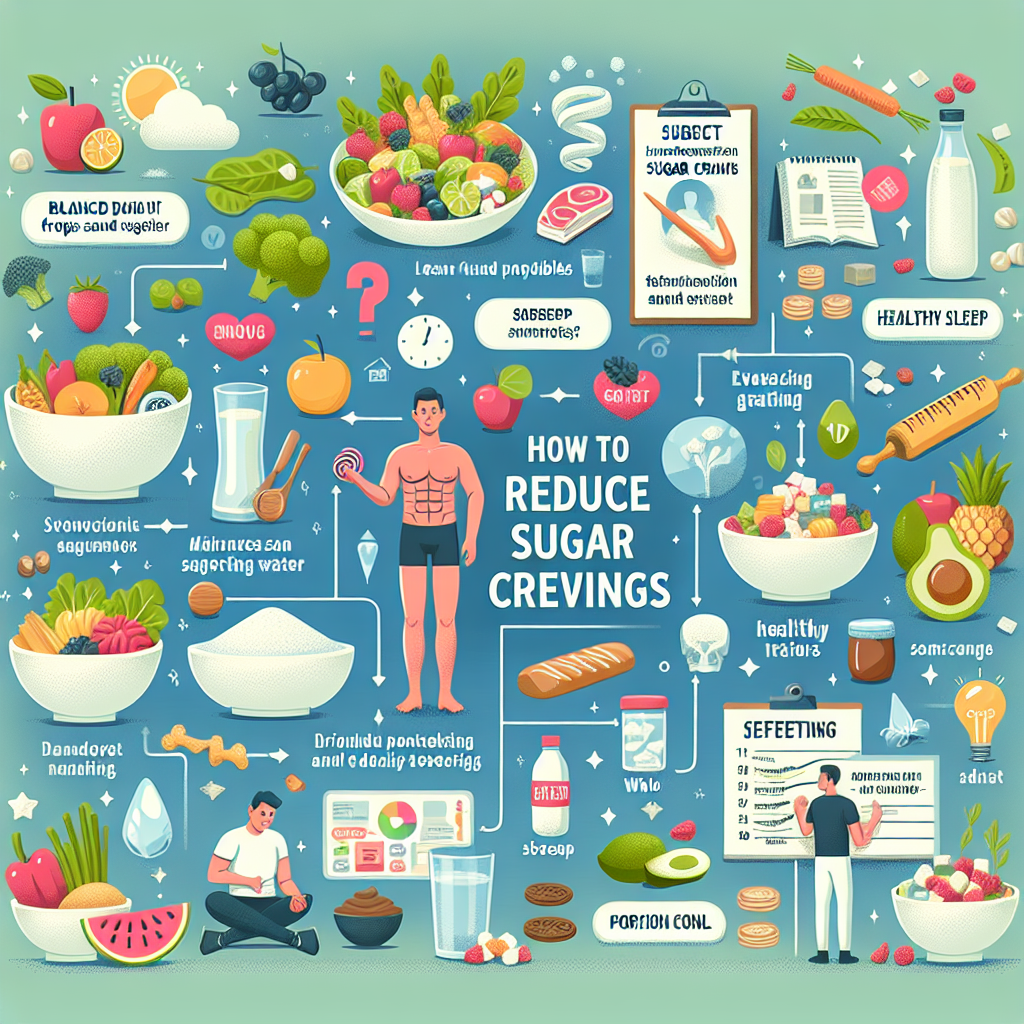How to Reduce Sugar Cravings Effectively

Discover effective ways to reduce your sugar cravings now! Visit www.myvibrantvitality.com for more information.
Effective Strategies to Overcome Sugar Cravings
Sugar cravings can be a formidable adversary for anyone trying to maintain a healthy diet. They can strike at any time, often leading to overindulgence in sweets and other sugary treats. However, there are effective strategies to overcome these cravings and maintain a balanced diet.
Firstly, it’s essential to understand that sugar cravings are often a sign of an underlying issue. It could be a lack of certain nutrients, stress, or even just habit. Therefore, it’s crucial to identify the root cause of your cravings. For instance, if you’re stressed, finding ways to manage your stress levels can help reduce your sugar cravings. This could involve activities such as yoga, meditation, or even just taking a walk.
Another effective strategy is to ensure that you’re eating a balanced diet. Consuming enough protein, fiber, and healthy fats can help keep your blood sugar levels stable and prevent sugar cravings. For example, starting your day with a protein-rich breakfast can help curb your desire for sweets later in the day. Additionally, incorporating foods high in fiber, such as fruits, vegetables, and whole grains, into your meals can help you feel fuller for longer and reduce your desire for sugar.
Hydration is another key factor in managing sugar cravings. Sometimes, our bodies can mistake thirst for hunger, leading us to reach for sugary snacks when what we really need is water. Therefore, ensuring that you’re drinking enough water throughout the day can help keep your cravings at bay.
Moreover, getting enough sleep is also crucial. Lack of sleep can disrupt your body’s hunger hormones, leading to increased cravings for sugar. Therefore, ensuring that you’re getting a good night’s sleep can help regulate your body’s hunger signals and reduce your desire for sweets.
Another effective strategy is to practice mindful eating. This involves paying attention to what and when you’re eating, and why you’re eating it. By being more mindful of your eating habits, you can start to identify patterns and triggers for your sugar cravings. For instance, you might notice that you tend to crave sugar when you’re bored or stressed. Once you’ve identified these triggers, you can start to find healthier ways to cope with them.
Lastly, it’s important to remember that it’s okay to indulge in your favorite sweet treats occasionally. Completely denying yourself can often lead to overeating later on. Instead, try to enjoy your favorite sweets in moderation, and make sure to savor every bite.
In conclusion, overcoming sugar cravings is not about deprivation, but about balance. By identifying the root cause of your cravings, eating a balanced diet, staying hydrated, getting enough sleep, and practicing mindful eating, you can effectively manage your sugar cravings. Remember, it’s okay to indulge occasionally, but the key is moderation. With these strategies, you can start to take control of your sugar cravings and maintain a healthier diet.
Understanding and Combating Your Sugar Cravings: A Comprehensive Guide

Sugar cravings are a common struggle for many individuals. They can be particularly challenging to overcome due to the addictive nature of sugar. However, understanding the root causes of these cravings and implementing effective strategies can significantly reduce their intensity and frequency.
Sugar cravings are primarily driven by the brain’s demand for a quick source of energy. When you consume sugar, your brain releases dopamine, a neurotransmitter that induces feelings of pleasure. This reward system can lead to a cycle of cravings and consumption, making it difficult to resist sugary foods. Additionally, certain factors such as stress, lack of sleep, and hormonal changes can exacerbate these cravings.
To combat sugar cravings, it is crucial to maintain a balanced diet. Consuming adequate amounts of protein, fiber, and healthy fats at each meal can help stabilize blood sugar levels and prevent the onset of cravings. For instance, starting your day with a protein-rich breakfast can provide sustained energy and curb the desire for a mid-morning sugar fix.
In addition to a balanced diet, regular physical activity can also play a significant role in reducing sugar cravings. Exercise helps regulate your mood and energy levels, reducing the need for a sugar boost. Moreover, it stimulates the production of endorphins, the body’s natural mood elevators, which can help combat the dopamine-driven reward cycle associated with sugar consumption.
Hydration is another key factor in managing sugar cravings. Sometimes, the body can mistake thirst for hunger, leading to unnecessary snacking on sugary foods. Therefore, drinking plenty of water throughout the day can help keep cravings at bay.
Mindful eating is a powerful tool in the fight against sugar cravings. This practice involves paying full attention to the eating experience, from the taste and texture of the food to the feelings of fullness. By eating mindfully, you can better recognize true hunger and differentiate it from cravings.
Stress management is also essential in reducing sugar cravings. Stress can trigger cravings as the body seeks a quick source of energy and comfort. Techniques such as meditation, yoga, and deep breathing can help manage stress levels and, in turn, control cravings.
Sleep plays a pivotal role in appetite regulation. Lack of sleep can disrupt the balance of hunger hormones, leading to increased cravings for sugary foods. Therefore, ensuring adequate sleep is a crucial part of any strategy to reduce sugar cravings.
Lastly, gradual reduction of sugar intake can be more effective than abrupt elimination. Going cold turkey can lead to withdrawal symptoms and intense cravings. Instead, try reducing your sugar intake gradually, substituting refined sugars with natural sweeteners like fruits.
In conclusion, reducing sugar cravings effectively involves a comprehensive approach that includes a balanced diet, regular physical activity, adequate hydration, mindful eating, stress management, and sufficient sleep. While it may seem challenging at first, with consistency and patience, it is possible to overcome sugar cravings and enjoy a healthier lifestyle. Remember, it’s not about completely eliminating sugar from your diet, but rather about creating a healthier relationship with food where sugar does not hold the reins.
The Science Behind Sugar Cravings and How to Beat Them
Sugar cravings are a common struggle for many people, often leading to unhealthy eating habits and weight gain. Understanding the science behind these cravings can provide valuable insights into how to effectively manage and reduce them.
Sugar cravings are primarily driven by the brain’s demand for a quick source of energy. When you consume sugar, your body breaks it down into glucose, which is then used to fuel your cells. This process triggers the release of dopamine, a neurotransmitter that creates feelings of pleasure and reward. This dopamine release is what makes sugar so addictive, and why you might find yourself reaching for a sweet treat when you’re feeling low or stressed.
However, this sugar-induced dopamine rush is short-lived. As your blood sugar levels drop, so do your dopamine levels, leading to feelings of lethargy and further cravings. This cycle, known as the sugar rollercoaster, can be difficult to break. But with a better understanding of what drives these cravings, you can take steps to reduce them.
One effective strategy is to maintain stable blood sugar levels throughout the day. This can be achieved by eating regular, balanced meals and snacks that are high in protein, fiber, and healthy fats. These nutrients slow down the absorption of sugar into your bloodstream, preventing the sudden spikes and crashes that drive cravings.
Another approach is to practice mindful eating. This involves paying close attention to what and when you’re eating, and why. Are you genuinely hungry, or are you eating out of boredom, stress, or habit? By becoming more aware of your eating patterns, you can start to make healthier choices and resist the urge to reach for sugar.
Physical activity is also a powerful tool in combating sugar cravings. Exercise not only helps to regulate your blood sugar levels but also boosts your mood and energy levels, reducing the need for a sugar hit. Even a short walk can be enough to curb a craving.
Sleep is another crucial factor. Lack of sleep can disrupt your body’s hunger hormones, leading to increased appetite and cravings for high-sugar foods. Ensuring you get a good night’s sleep can therefore help to keep your cravings in check.
Finally, don’t underestimate the power of hydration. Thirst can often be mistaken for hunger, leading you to reach for a sugary snack when what you really need is a glass of water. Staying well-hydrated throughout the day can help to prevent this.
While it’s unrealistic to expect to eliminate sugar cravings entirely, these strategies can help you to manage them more effectively. Remember, it’s not about depriving yourself, but about making healthier choices that support your overall wellbeing. It’s okay to enjoy a sweet treat occasionally, but it’s important to do so mindfully and in moderation.
In conclusion, sugar cravings are a complex interplay of biological, psychological, and environmental factors. By understanding the science behind these cravings, and implementing strategies such as maintaining stable blood sugar levels, practicing mindful eating, staying active, getting enough sleep, and staying hydrated, you can significantly reduce your sugar cravings and take control of your health.